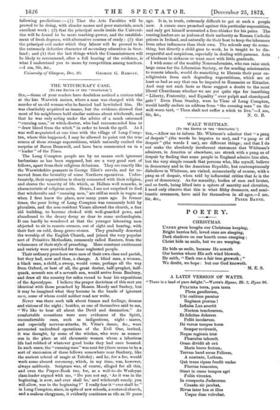THE WITCHCRAFT CASE.
[TO THB EDITOR OF THE "SPECTATOR."] SIR,—Some of your readers have doubtless noticed a curious trial at the late Warwick assizes, where a man was charged with the murder of an old woman who he fancied had bewitched him. He was charitably acquitted as insane, but the evidence showed that most of his neighbours held similar notions about witchcraft, and that he was only acting under the advice of a much esteemed " cunning man," or witch-doctor, who had recommended him to "draw blood from the witch" in order to break the spell. As I was well acquainted at one time with the village of Long Comp- ton, where this happened, I may be allowed to point out the true source of these strange superstitions, which naturally excited the surprise of Baron Bramwell, and have been commented on in a " leader " of the Times.
The Long Compton people are by no means such ignorant barbarians as has been supposed, but are a very good sort of fellows, apart from their religious delusions. They are exactly like the Warwickshire peasants in George Eliot's novels, and far re- moved from the brutality of some Northern operatives. Unfor- tunately, their superstition is closely connected with their religion, and shares the tenacity of life which, as Hallam well remarks, is characteristic of religious sects. Hence, I am not surprised to find that witcherafts and " cunning men," are still as much in vogue as when I first knew the place, now many years ago. In former times, the poor living of Long Compton was commonly held by pluralists, and the non-resident Vicars allowed the church, a fine old building, to become choked with well-guarded pews, and abandoned to the dreary decay so dear to some archaeologists. It can hardly be wondered at that the younger labouring men objected to sit in remote corners, out of sight and hearing, with their feet on cold, damp grave-stones. They gradually deserted the worship of the English Church, and joined the very popular sect of Primitive Methodists, commonly called Ranters, from the vehemence of their style of preaching. Here constant excitement and variety were provided for these neglected people.
Their ordinary preachers were men of their own class and parish, but they had, now and then, a change. A blind man, a woman, a black man, a child, a sweep, would come, perhaps all the way from Oxford, or best of all, the great doctor, half-prophet, half- quack, seventh son of a seventh son, would arrive from Banbury, and draw all the country for miles round to hear his expositions of the Apocalypse. I believe the proper doctrines of this sect are identical with those preached by Messrs. Moody and Sankey, but it may be imagined what they became in the hands of ignorant men, some of whom could neither read nor write.
Never was there such talk about frames and feelings, dreams and visions of the night ; besides, as one of themselves said to me, " We like to hear all about the Devil and damnation." As comfortable sensations were sure evidences of the Spirit, uncomfortable ones, such as indigestions, night - mares, and especially nervous-attacks, St. Vitus's dance, &c., were accounted undoubted operations of the Evil One, invited, it was thought, by some of the witches, who were as numer- ous in the place as old rheumatic women whom a laborious life had robbed of whatever good looks they had once boasted. In such cases, the "cunning man" was sent for (there seems to be a sort of succession of these fellows somewhere near Banbury, like the ancient school of magic at Toledo) ; and he, for a fee, would work some absurd ceremony, which, in my time, was, however, always unbloody. Scripture was, of course, alleged for all this, and even the Prayer-Book too, for, as a well-to-do Wesleyan class.leader argued with me, " Do you not say, As it was in the beginning, is now, and ever shall be,' and witchcraft surely, you will allow, was in the beginning ?" I really fear it " ever shall be " in Long Compton, since, in spite of new schools, a restored church, and a zealous clergyman, it evidently continues as rife as 30 years ago. It is, in truth, extremely difficult to get at such a people now. A curate once preached against this particular superstition, and only got himself accounted a free-thinker for his pains. • The ranting leaders are as jealous of their authority as Roman Catholic priests in Ireland, and naturally do their best to keep the labourers from other influences than their own. The schools may do some- thing, but directly a child goes to work, he is taught to be dis- respectful and suspicious, especially in dealing with parsons. Acts of kindness in sickness or want meet with little gratitude.
I wish some of the wealthy Nonconformists, who can raise such large sums for the Liberation Society, or for sending missionaries to remote islands, would do something to liberate their poor co- religionists from such degrading superstitions, which are at least as bad as any that can be imputed to Romanist or Ritualist. And may not such facts as these suggest a doubt to the most liberal Churchman whether we are yet quite ripe for inscribing " Liberty, Fraternity, and Equality " over pulpit and churchyard gate? Even Dean Stanley, were he vicar of Long Compton, would hardly endure an address from "the cunning man" on the well-worn text, " Thou shalt not suffer a witch to live."—I am,


































 Previous page
Previous page